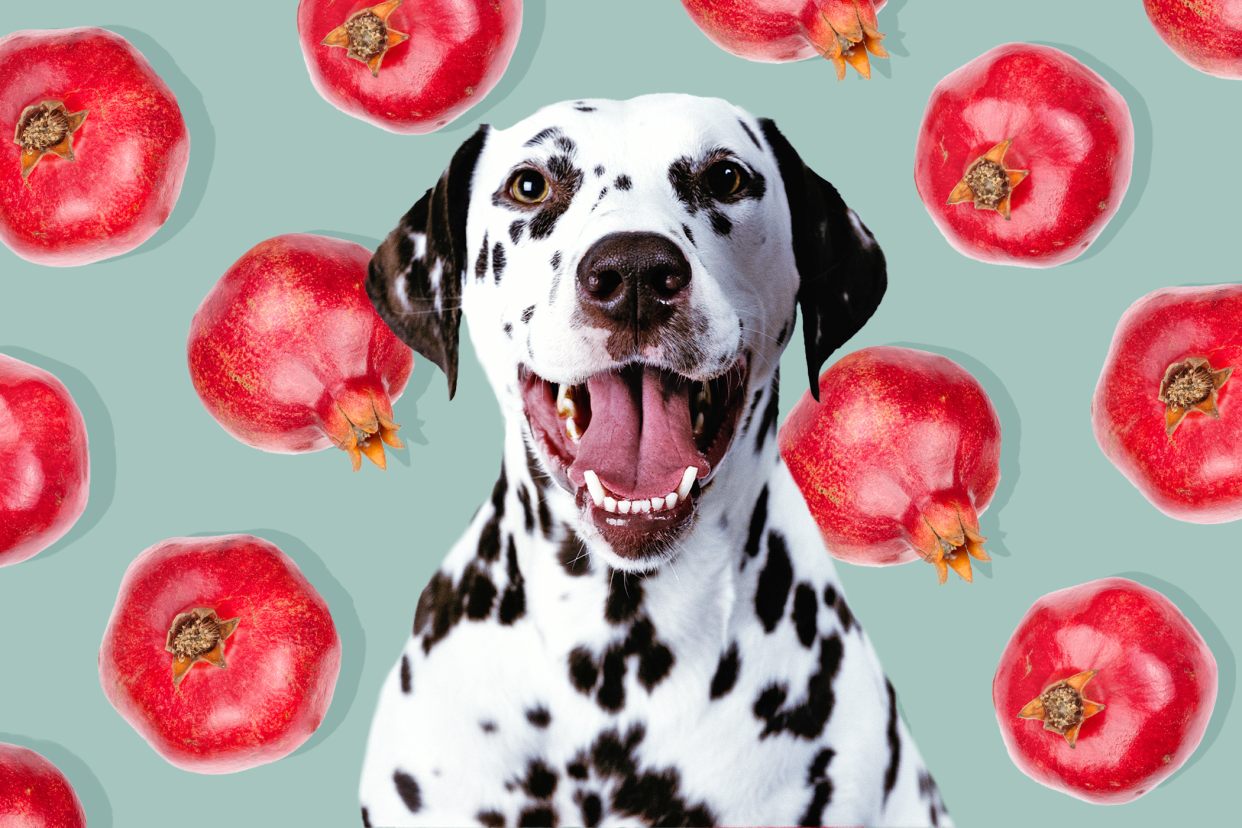Can Dogs Eat Pomegranate? It's Complicated

kolesnikovserg / Adobe Stock / Colin Hawkins / Getty
TABLE OF CONTENTS
On This Page
Are Pomegranates Good for Dogs?
Can Dogs Eat Pomegranate Seeds?
Pomegranate Dog Treats
Other Dog-Safe Fruits
To your dog, a pomegranate looks less like a sweet, juicy fruit and more like a bright red ball to play with. So if one rolls off the counter and across the floor, he might pounce and bite into it, tail wagging. But can dogs eat pomegranate safely?
Are Pomegranates Good for Dogs?
Thashia Reddy, DVM, is a consulting veterinarian with Petcube Online Vet, a telehealth veterinary service. She says pomegranates aren't poisonous to dogs; so if your pooch is quick to gobble up dropped food scraps, you don't need to worry. However, parts of this ancient Middle Eastern fruit are known to make dogs sick, so you shouldn't feed it to them as a snack.
"Pomegranate skin and membrane could potentially be toxic to dogs if consumed in large quantities, as they contain small amounts of cyanide," Reddy says. "However, it's unlikely that your dog would consume enough to experience any adverse effects."
She adds that if a dog eats too much pomegranate skin or membrane, they may experience gastrointestinal distress, including an upset stomach, vomiting, and diarrhea. They might also have abdominal pain, bloating, or intestinal blockages.
In severe cases, tannins (complex chemical substances derived from phenolic acids) in the pomegranate skin and membrane can also cause liver damage.
Can Dogs Eat Pomegranate Seeds?
Pomegranates are known for their tiny, fleshy, ruby-colored arils. These are sometimes referred to as the pomegranate's seeds, but the fruit's actual seeds are enclosed inside these sweet-tasting spheres. Humans, birds, and other herbivores can eat and digest entire pomegranate arils without worry. Dogs can't.
"The seeds themselves can be toxic to dogs, so it's important to remove them before feeding the [juicy arils portion] to your pet," Reddy says. "If you're feeding your dog store-bought pomegranate treats, check the ingredients to make sure the seeds have been removed."
So, to be clear: Dogs can't safely eat pomegranate seeds, but they can eat the fleshy arils that house the seeds. Separating the two is probably far more trouble than its worth, though Reddy says the juicy bits of pomegranate arils are a safe, occasional treat for dogs.
"Pomegranates are packed with antioxidants, vitamins, and minerals that can help support a dog's immune system, joint health, and skin and coat health," she explains. "The arils are a good source of fiber and protein, and they're low in calories."
But if that pesky pomegranate bounces across the floor and your pup crunches into a few arils (seeds and all), Reddy says they probably won't hurt them. That said, she adds that some dogs may be allergic to pomegranate. "If your dog shows any signs of an allergic reaction (e.g., itching, redness, swelling, etc.), stop giving them pomegranates and consult your veterinarian."
RELATED: How to Tell If Your Dog Is Having an Allergic Reaction and What to Do
What About Pomegranate Dog Treats?
While this fruit will only make your dog sick if he eats a lot of it, there are pomegranate dog treats and dog foods containing pomegranate that are totally safe for your fur baby to chow down on. These pup-approved snacks have been stripped of everything potentially dangerous found in raw pomegranate, while still giving your dog antioxidants, vitamins, and minerals.
What Fruits Can Dogs Eat as Treats?
In general, it's best to keep your pup away from pomegranate. But there are some fruits, Reddy says, that dogs can snack on in moderation.
"Just be sure to remove the seeds, pits, and stems, as they can be dangerous for dogs," Reddy says. "There are also a variety of fruit-based dog treats available on the market."
Some dog-friendly fruits include:
Reddy adds that it's important to check with a veterinarian before feeding any type of fruit to a dog, as some fruits may not be safe for them to consume. These include grapes and raisins.

